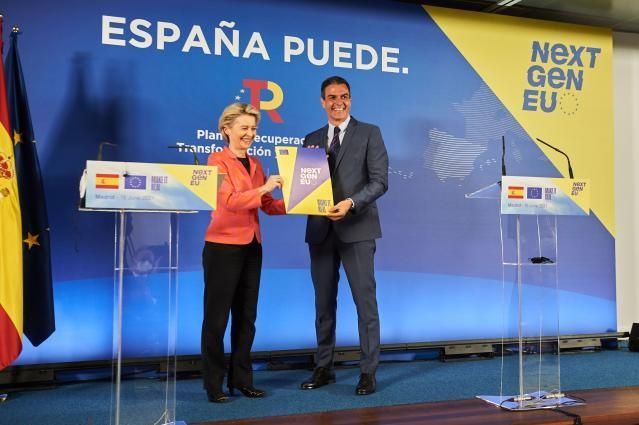The European Commission has adopted a positive assessment of Spain’s recovery and resilience plan. This is an important step towards the EU disbursing €69.5 billion in grants under the Recovery and Resilience Facility (RRF) over the period 2021-2026. This financing will support the implementation of the crucial investment and reform measures outlined in Spain’s recovery and resilience plan. It will play a key role in enabling Spain to emerge stronger from the COVID-19 pandemic.
The RRF – at the heart of NextGenerationEU – will provide up to €672.5 billion (in current prices) to support investments and reforms across the EU.
The Commission assessed Spain’s plan based on the criteria set out in the RRF Regulation. The Commission’s analysis considered, in particular, whether the investments and reforms set out in Spain’s plan contribute to effectively addressing challenges identified in the context of the European Semester; contain measures that effectively support the green and digital transitions; and contribute to strengthening the growth potential, job creation and economic and social resilience of the Member State.
Securing Spain’s green and digital transition
The Commission’s assessment finds that Spain’s plan devotes 40% of its total allocation to measures that support climate objectives. This includes measures to promote urban and long-distance sustainable mobility, increase the energy efficiency of buildings, decarbonise industry and reduce energy dependency, as well as to deploy new technologies for green hydrogen and renewables. The plan also includes measures to help mitigate the adverse effects of climate change by preserving coastal spaces, ecosystems and biodiversity and promote the circular economy by improving water and waste management.
The Commission finds that Spain’s plan devotes 28% of its total allocation to the digital transition. This includes measures on the digitalisation of the public administration, industry and business, including a specific programme for the digitalisation of SMEs. There are also investments in digital equipment for education and improving digital skills.
Reinforcing Spain’s economic and social resilience
The Commission’s assessment considers that Spain’s plan includes an extensive set of mutually reinforcing reforms and investments that contribute to effectively addressing all or a significant subset of the economic and social challenges outlined in the country-specific recommendations (CSRs) addressed to Spain by the Council in the European Semester in 2019 and in 2020. It includes measures in the areas of employment to reduce labour market segmentation and enhance active labour market policies. It also includes measures in the area of education and skills, as well as social policies, including support to the health system’s resilience and capacity. The plan addresses, to a large extent, CSRs in the areas of investment in the green and digital transition, research, development and innovation, clean and efficient production and use of energy, energy infrastructure, water and waste management and sustainable transport. There are also measures to enhance the business climate, with important actions planned in better regulation, the reduction of late payments, and the reform of the insolvency framework and public procurement. The plan also addresses the CSR in the area of public finances, including reforms of the spending review system, the tax system and the pension system.
The Spanish recovery and resilience plan contributes in a comprehensive and adequately balanced manner to all six pillars of the Regulation.
Supporting flagship investment and reform projects
Spain´s plan proposes projects in all seven European flagship areas. These are specific investment projects which address issues that are common to all Member States in areas that create jobs and growth and are needed for the twin transition. For instance, Spain’s plan includes €6.1 billion to invest in clean technologies and accelerate the development and use of renewables. The plan envisages €7.8 billion to improve the energy efficiency of public and private buildings. Other measures support the European Flagship Recharge and Refuel by investing in recharging and boosting electric vehicle infrastructure and promoting sustainable mobility.
The assessment also finds that none of the measures included in the plan do any significant harm to the environment.
The controls systems put in place by Spain are considered adequate to protect the financial interests of the Union. The plan provides sufficient details on how national authorities will prevent, detect and correct instances of conflict of interest, corruption and fraud relating to the use of funds.
Ursula von der Leyen
President Ursula von der Leyen said: “I am delighted to present the European Commission’s positive assessment of Spain’s €69.5 billion recovery and resilience plan. This plan will deeply transform Spain’s economy, make it greener, more digital, more resilient. We have endorsed this plan because it is ambitious, far-sighted and will help build a better future for the Spanish people. The strong national ownership of the plan bodes well for its successful implementation.”
With investments for jobs, growth, cleaner energy and digital technologies, it’s the recovery plan Spain 🇪🇸 needs now and for the future.
Let’s make it a success, together.
— Ursula von der Leyen (@vonderleyen) June 16, 2021







Leave a Reply